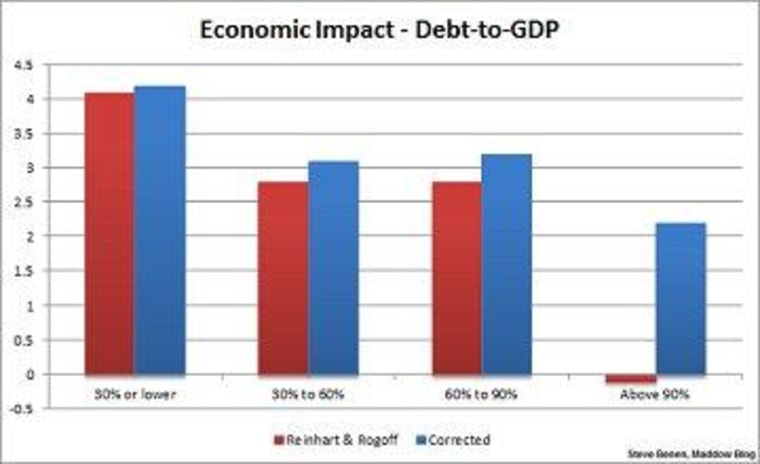We talked yesterday about a pretty important development for economics wonks. Carmen Reinhart and Kenneth Rogoff published a report a few years ago that was music to the ears of Republicans: when a nation's debt climbs above 90% of the nation's total economy, it necessarily serves as a drag on economic growth. The Reinhardt/Rogoff study became the intellectual foundation for austerity and a deliberate shift from job creation to debt reduction.
The problem, we now know, is that Reinhart and Rogoff made some important errors in their research, including a careless mistake in an Excel spreadsheet. The economic research embraced by conservatives everywhere was faulty.
Given yesterday's item, it's only fair to note that Reinhart and Rogoff have published a 500-word response, offering a half-hearted defense of their missteps. Those hoping the economists had an exculpatory explanation for their errors came away disappointed -- Paul Krugman described the response as "really, really bad" and "terrible." He later lamented the fact that the economists have "behaved badly."
And while Reinhart and Rogoff have quite a bit of work to do, it's important to realize that this story is about far more than a flawed study. I care that the Reinhardt/Rogoff report was mistaken, but I really care that the report was used to justify widespread and deliberate economic harm.
The Very Serious People took it on faith that once the debt-to-GDP ratio topped 90%, a nation has no choice but to pursue austerity measures. Jon Chait explained:
The finding led to quite a kerfuffle among economics bloggers. Newsweek’s libertarian/contrarian blogger Megan McArdle played the expected role of claiming “people are way overstating the impact that the 90% figure from Reinhart and Rogoff have had on austerity policies.” Probably someone, somewhere is overstating it -- the Internet is large, and any given event will be overstated by somebody -- but the impact of this study is very large. It was the intellectual basis for the Bowles-Simpson report. It was cited frequently by centrist editorials, news stories (which often read like editorials), Thomas Friedman, Joe Scarborough, and pretty much everybody in Congress.If you want to make the case that the Reinhart-Rogoff whoopsie is no big deal, implying that nobody paid much attention to it is not the way to go. Everybody paid attention to it.
I know better than to hope for accountability, but given the significance Republicans, news organizations, and the DC establishment placed on the flawed Reinhardt/Rogoff findings, can we begin the discussion anew about focusing on economic growth and job creation? Can every Republican who based their talking points on this study be asked whether they're prepared to reevaluate their misguided assumptions about slashing investments and hurting the economy on purpose?
